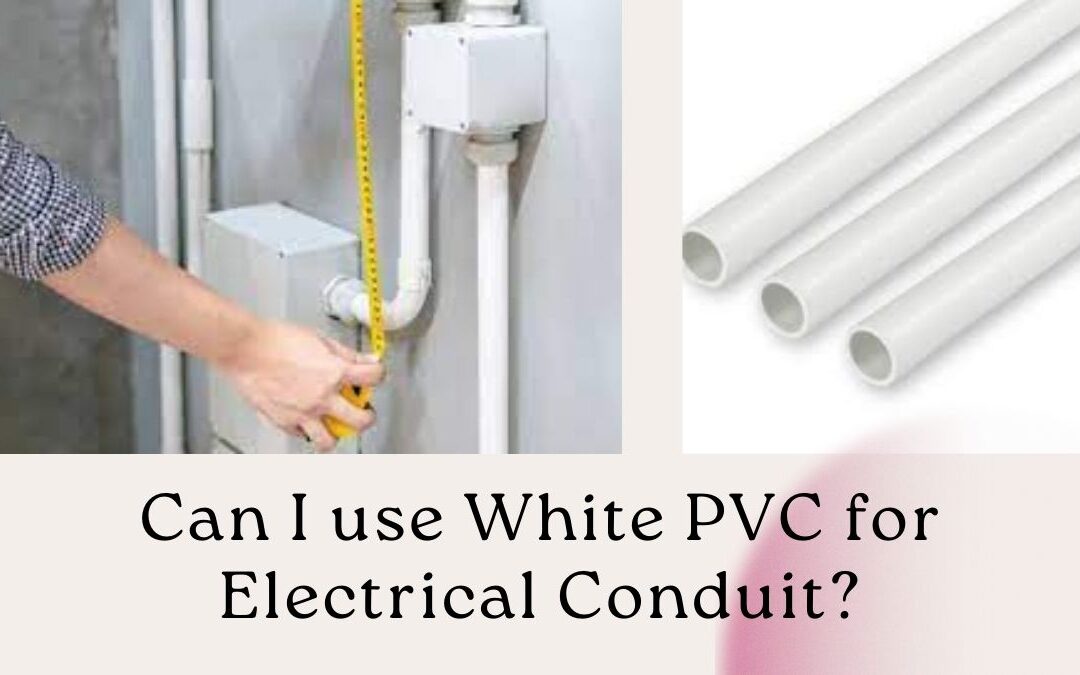Can I use White PVC for Electrical Conduit? This is a common question that arises when considering electrical installations. In this blog, we will delve into the topic of using white PVC for electrical conduit purposes and explore the advantages and potential considerations associated with this choice. Electrical conduit plays a critical role in protecting electrical wiring and ensuring safety in various applications. By understanding the suitability of white PVC for electrical conduit installations, you can make informed decisions for your electrical projects. We will discuss the properties of white PVC, its benefits, code requirements, and potential limitations. So, if you’re curious about using white PVC for electrical conduit and want to weigh its pros and cons, keep reading to gain valuable insights and make informed choices for your electrical installations.
Understanding PVC Electrical Conduit
Can I use White PVC for Electrical Conduit? This question often arises when considering electrical installations. PVC (Polyvinyl Chloride) electrical conduit is a popular choice due to its affordability, durability, and ease of installation. In this article, we will explore the ins and outs of PVC electrical conduit, including its benefits, applications, and considerations.
PVC electrical conduit is a non-metallic tubing system designed to protect and route electrical wiring in residential, commercial, and industrial settings. It is available in various colours, including white, which raises the question of its suitability for electrical conduit purposes.
When considering using white PVC for electrical conduit, it is essential to understand the advantages it offers. Firstly, white PVC conduit is resistant to corrosion, moisture, and chemicals, providing long-lasting protection for electrical wiring. Additionally, it is lightweight and easy to handle, making installation more convenient. Furthermore, PVC conduit is non-conductive, meaning it does not conduct electricity, enhancing safety in electrical systems.
However, it is important to note that while white PVC conduit is widely used, specific code requirements may dictate the acceptable colours for certain applications. It is crucial to consult local electrical codes and regulations to ensure compliance with colour guidelines.
Benefits of Using White PVC for Electrical Conduit
Can I use White PVC for Electrical Conduit? The answer is yes, and there are several benefits to using white PVC for electrical conduit in various applications. White PVC (Polyvinyl Chloride) conduit offers numerous advantages that make it a popular choice among electricians and contractors. In this article, we will explore the benefits of using white PVC for electrical conduit and shed light on its versatility and reliability.
- Durability and Longevity: White PVC conduit is known for its exceptional durability. It can withstand extreme temperatures, moisture, and corrosive environments, ensuring long-lasting protection for electrical wiring. The inherent resistance of PVC to rust, rot, and decay makes it an excellent choice for both indoor and outdoor electrical installations.
- Ease of Installation: White PVC conduit is lightweight and easy to handle, which simplifies the installation process. It can be easily cut, joined, and bent to suit various routing requirements, reducing installation time and effort. The availability of fittings and connectors specifically designed for PVC conduit makes the installation even more convenient.
- Electrical Insulation: One of the key advantages of white PVC conduit is its non-conductive nature. PVC is a good electrical insulator, meaning it does not conduct electricity. This property adds an extra layer of safety to electrical systems by reducing the risk of electrical shock and short circuits.
- Cost-Effectiveness: White PVC conduit is cost-effective compared to other electrical conduit materials. PVC is generally more affordable than metal conduits such as galvanised steel or aluminium. Its lower cost, combined with its durability and longevity, makes white PVC conduit a cost-effective solution for electrical installations.
- Versatility: White PVC conduit is available in a range of sizes, allowing for versatility in different electrical applications. It can be used in residential, commercial, and industrial settings to protect and route electrical wiring for lighting, power distribution, and communication systems.
Code Requirements and Safety Considerations
Can I use White PVC for Electrical Conduit? Understanding code requirements and safety considerations is crucial when it comes to selecting the appropriate conduit for electrical installations.
Electrical codes and regulations vary by jurisdiction, and it is essential to consult the local building codes or contact a qualified electrician for specific requirements. However, in many regions, white PVC conduit is accepted and widely used for electrical installations, provided it meets certain criteria.
- Code Compliance: When using white PVC conduit for electrical installations, it is important to ensure compliance with local electrical codes. These codes may specify requirements such as conduit size, burial depth, securing methods, and grounding provisions. It is crucial to follow these guidelines to ensure the safety and integrity of the electrical system.
- UV Resistance: If the white PVC conduit is installed outdoors, it is essential to consider its UV resistance. Excessive exposure to sunlight can cause degradation and discoloration of the conduit over time. UV-resistant white PVC conduit is available, specifically designed to withstand outdoor conditions and maintain its structural integrity.
- Temperature Rating: White PVC conduit typically has a temperature rating suitable for most electrical applications. However, in situations where high temperatures are expected, such as near heat sources or in industrial settings, it is important to verify that the chosen PVC conduit can handle the anticipated temperature range without compromising its performance.
- Fire Resistance: PVC conduit is inherently flame-retardant, but its fire resistance may vary depending on the specific formulation and additives. It is crucial to select PVC conduit that meets the necessary fire resistance standards for the intended application.
- Proper Installation: Proper installation is key to ensuring the safety and effectiveness of white PVC conduit. This includes correctly securing the conduit, using appropriate fittings and connectors, and following proper bending and routing techniques. Adhering to installation guidelines and manufacturer recommendations is vital to maintain the structural integrity and electrical safety of the conduit system.

Limitations and Potential Drawbacks
Can I use White PVC for Electrical Conduit? While white PVC conduit offers several benefits for electrical installations, it is essential to consider its limitations and potential drawbacks.
- Temperature Limitations: White PVC conduit has temperature limitations that must be considered. PVC is not suitable for high-temperature environments as it may soften or deform under extreme heat. It is crucial to verify the temperature rating of the PVC conduit and ensure it is appropriate for the specific electrical application.
- Impact Resistance: While PVC conduit is generally durable, it may not provide the same level of impact resistance as metal conduit. In areas where there is a higher risk of physical damage or impact, such as industrial or heavy traffic areas, metal conduit may be a more suitable choice.
- Expansion and Contraction: PVC conduit can expand and contract with temperature changes. In outdoor installations exposed to wide temperature variations, proper expansion joints or fittings must be used to accommodate the thermal movement and prevent damage to the conduit system.
- Limited Fire Resistance: While PVC conduit is flame-retardant, it is important to note that it is not entirely fireproof. In high-risk fire areas, alternative conduit materials with higher fire resistance may be required to meet specific safety regulations.
- Chemical Resistance: PVC conduit may not be suitable for installations where it will be exposed to certain chemicals or solvents. It is important to consider the compatibility of PVC conduit with the environment in which it will be installed to prevent degradation or damage over time.
Alternatives to White PVC for Electrical Conduit
Can I use White PVC for Electrical Conduit? While white PVC conduit is a common choice for electrical installations, there are alternative materials available that may better suit specific needs and requirements.
- Metal Conduit: Metal conduit, such as galvanised steel or aluminium, offers superior strength and durability compared to PVC. It provides enhanced protection against physical damage and is often used in industrial or high-traffic areas where impact resistance is crucial.
- Flexible Conduit: Flexible conduit, typically made of materials like metal or PVC-coated steel, offers excellent versatility and ease of installation. It is ideal for applications that require bending or routing around obstacles.
- Non-Metallic Conduit: Non-metallic conduit, such as fibreglass or high-density polyethylene (HDPE), provides a durable and lightweight alternative to PVC. These materials offer resistance to corrosion, UV rays, and various chemicals, making them suitable for outdoor or corrosive environments.
- EMT Conduit: Electrical Metallic Tubing (EMT) is a thin-walled metal conduit commonly used in residential and commercial applications. It is cost-effective and easy to work with, making it a popular choice for indoor installations.
When considering alternatives to white PVC for electrical conduit, it is essential to evaluate specific project requirements, local building codes, and the environment in which the conduit will be installed. Consulting with electrical professionals and understanding the regulations in your area will help you make an informed decision regarding the most suitable conduit material for your electrical needs.
Releted Post :Can you use Plumbing PVC for Electrical Conduit? |Can you run Romex in PVC Conduit? |Will salt damage PVC pipe? | How to Remove Dried PVC Glue from Pipes?|How to Connect Copper Pipe to PVC?|How to Thread PVC Pipe for Your Projects|How Long Does PVC Pipe Last? | Innovative PVC Pipe Dishwasher Designs for Modern Kitchens
Conclusion
In conclusion, the decision to use white PVC for electrical conduit involves weighing the benefits and drawbacks, as well as adhering to code requirements and safety considerations. While white PVC conduit can be a suitable choice in many electrical applications, it’s important to assess the specific requirements of your project and consult with professionals when necessary.

